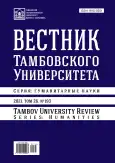The essence of formative assessment and its role in the foreign language teaching
- Authors: Stepanova N.A.1
-
Affiliations:
- Derzhavin Tambov State University
- Issue: Vol 26, No 193 (2021)
- Pages: 90-97
- Section: ТЕОРИЯ И МЕТОДИКА ОБУЧЕНИЯ ИНОСТРАННОМУ ЯЗЫКУ В СРЕДНЕЙ ШКОЛЕ
- URL: https://journal-vniispk.ru/1810-0201/article/view/298416
- DOI: https://doi.org/10.20310/1810-0201-2021-26-193-90-97
- ID: 298416
Cite item
Full Text
Abstract
The main principles of constructivism (taking into account and developing the cognitive interests of students, encouraging mutual learning and activating peers as sources of learning), which underlie modern pedagogy and linguodidactics, are considered. A comparison of a traditional lesson and a lesson built on the principles of constructivism is carried out, it is shown how the essence of assessment and attitude towards it change at the present stage of development of education and in theory. Particular attention is paid to the problem of formative assessment, in particular, its specificity at different stages of training and the roles that are assigned in it to participants in the educational process – teacher, student and classmates are discussed. The definition of formative assessment is clarified and its various aspects are considered: the involvement of students in the process of goal-setting, self- and mutual control; the quality of the questions used by the teacher in the classroom and the quality of the feedback; subsequent use of the results of the final assessment for educational purposes. The functions of formative assessment are revealed. The levels of formative assessment (low, medium and high) are analyzed, the choice of which depends on the learning context. The relevance of formative assessment to educational results with an emphasis on the development of subject and meta-subject skills in accordance with the Federal State Educational Standard of General Secondary Education is demonstrated.
Keywords
About the authors
N. A. Stepanova
Derzhavin Tambov State University
Author for correspondence.
Email: natalya.gem@rambler.ru
ORCID iD: 0000-0002-4981-4182
Post-Graduate Student, Linguistics and Humanitarian Pedagogic Education Department
33 Internatsionalnaya St., Tambov 392000, Russian FederationReferences
- Piaget J. The Language and Thought of the Child. New York, The Humanities Press Inc., 1959, 288 p.
- Vygotsky L. Mind in Society: The Development of Higher Psychological Processes. Cambridge, Harvard Uni-versity Press, 1978, 159 p.
- Brooks J., Brooks M. In Search of Understanding: the Case for Constructivist Classrooms. Alexandria, ASCD Publ., 1993, 143 p.
- Suskie L. Assessing Student Learning. A Common Sense Guide. San Francisco, Jossey-Bass Publ., 2018, 387 p.
- Shchukin A.N. Obucheniy Inostrannym Yazykam: Teoriya i Praktika [Teaching Foreign Languages: Theory and Practice]. Moscow, Filomatis Publ., 2004, 407 p. (In Russian).
- Cizek G.J. An introduction to formative assessment: history, characteristics, and challenges. Handbook of For-mative Assessment. New York, Taylor and Francis Group Publ., 2010, pp. 3-18, 377 p.
- Black P., William D. Inside the black box: Raising standards through classroom assessment. Phi Delta Kappan. 1998, vol. 80, no. 2, pp. 139-148.
- Ramaprasad A. On the definition of feedback. Behavioral Science, 1983, vol. 28, no. 1, pp. 4-13.
- Stiggins R.J. Student-Involved Assessment for Involving for Learning. New Jersey, Prentice Hall Publ., 2005, 531 p.
- Black P., William D. Developing a theory of formative assessment. Assessment and Learning. London, Sage Publ., 2005, pp. 81-100.
- McMillan J.H. The practical implications of educational aims and contexts for formative assessment. Hand-book of Formative Assessment. New York, Taylor and Francis Group Publ., 2010, pp. 41-58. 377 p.
Supplementary files








